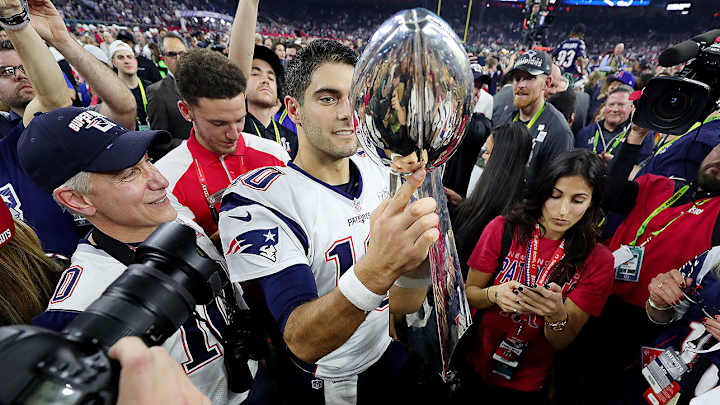Jimmy Garoppolo's Instagram hack caused little harm, but legal options still remain

Early on Friday morning, a post on Patriots quarterback Jimmy Garoppolo’s Instagram account implied that Garoppolo had been traded. “So grateful for my time in New England,” the post read. “Peace out Boston.” Garoppolo, who played well in the absence of Tom Brady at the start of the 2016 season, is considered a top trade target of the Browns, among other teams.
The 25-year-old Garoppolo has been the center of plenty of trade speculation this off-season because his rookie contract will expire at the end of the 2017 season, sending him into the open market as an unrestricted free agent. The Patriots are unlikely to use the franchise tag on Garoppolo next year—which would pay him the average of the top five quarterback salaries in the NFL in 2018—while also paying Brady $22 million a year. That arrangement would consume a substantial portion of the team’s available salary cap space.
Although Garoppolo’s Instagram post was politely worded and referenced a logical possibility, it wasn't published by the quarterback himself. Later on Friday morning Garoppolo took to Facebook to declare the Instagram post a “hoax” and deleted it. Earlier, Patriots officials had told various media that Garoppolo had not been traded, and it has been widely reported that the team does not intend to trade Garoppolo. Some commentators were already skeptical that the Patriots would trade Garoppolo, given that Brady is under contract to play through the 2019 season and, by all accounts, intends to play for several more seasons despite being 39.
NFL free agency rumors: Live analysis of the latest signings and trades
At first it seemed plausible that Garoppolo might have simply been poking fun at all the trade rumors and media speculation surrounding him. Or perhaps he was simply playing with the literal meaning of words: Maybe he was moving his residence from Boston to a suburb of Boston, or traveling outside of the city.
None of those possibilities seemed likely, however. Garoppolo knows that the Patriots and particularly Bill Belichick would surely disapprove of anything exacerbating the attention on his trade talks, such as a practical joke on social media.
The circumstances and accompanying motivations for a hack range widely. Someone Garoppolo knows and has shared his password with could have logged on as him and posted. A more troubling possibility is that someone who Garoppolo doesn’t know might have unlawfully obtained his password.
The 10 most meaningful signings of free agency so far
Garoppolo is not the first football player victimized by a hack. Last April, Ole Miss offensive tackle Laremy Tunsil had his Twitter and Instagram hacked right before the 2016 NFL draft. The hacker posted a video of Tunsil smoking a bong through a gas mask and an exchange between Tunsil and a Ole Miss athletics official regarding who was responsible for paying the rent for Tunsil’s mother. Tunsil entered the night all but assured of going in the top 10 but dropped to the Dolphins at No. 13.
If Garoppolo’s Instagram post was a prank by someone close to the quarterback with access to his password, don’t expect any legal fallout. To be sure, Garoppolo might be annoyed that someone he knows would play a practical joke on him, but the court system is unlikely to play any role in that fallout.
If, however, the account was hacked by a cyber intruder, there could very well be legal fallout. It is a crime to hack. The federal Computer Fraud and Abuse Act prohibits unlawful access into another person’s computer and data without authorization. Persons convicted of violating the CFAA can receive a five-year prison sentence for each hack.
Garoppolo could also sue the hacker (if he or she were identified) for such claims as invasion of privacy, tortious interference and intentional infliction of emotional distress. Garoppolo would argue that the hack invaded the privacy of his social media account, interfered with his relationship with the Patriots and caused him emotional distress. Damages might be difficult to show, although embarrassment and harming one’s relationship with his or her employer could be grounds for compensation.
Stay tuned—though perhaps Garoppolo’s Instagram page is not the best source of information.
Michael McCann is SI’s legal analyst. He is also an attorney and a tenured law professor at the University of New Hampshire School of Law.

Michael McCann is a legal analyst and writer for Sports Illustrated and the founding director of the Sports and Entertainment Law Institute (SELI) at the University of New Hampshire School of Law, where he is also a tenured professor of law.